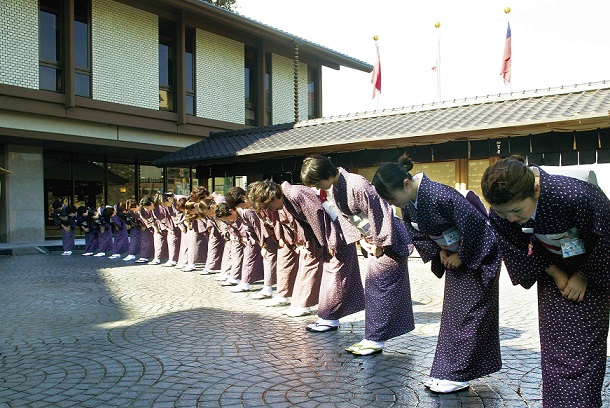Do you think it’s true that the Japanese have a heart of “omotenashi”?
Today, we’d like to introduce three Omotenashi spirits that Japanese ladies and gentlemen need to remember.
What “Omotenashi” is all about?
It’s one of the bad things about the Japanese to be willing to use a certain word without deeply thinking its meaning just because it’s popular.
(1) Polite expression for a Japanese verb “motenasu” — being hospitable to guest
“Omotenasi” as it is known today, comes from a Japanese verb “motenasu”, meaning “entertain a guest”. We use this verb when saying “Kyaku wo motenasu” (we entertain a guest). The source of “motenasu” comes from “to achieve what you want by means of something”, which refers to how to treat a guest or treatment that one offers a guest. By “something”, it means two kinds of things; both visible and invisible.
(2) “Uraomotenashi” — straightforward and truthful
As the Japanese word “ura-omotenashi” means itself, it signifies a welcome extended to a guest with a truthful mind. These above two meaning 1) and 2) are generally thought to be an origin of “omotenashi”.
What is “Omotenashi” spirit?
(1) You need to take care of others beyond their expectations
Can you see the difference between “omotenashi” and “service”? When a waiter brings you an oshibori (a small damp towel to wipe dirty on hands) at a restaurant, it’s classified into “service”, so is the case with when a waitress lays out a futon for you at a Japanese traditional hotel.
What makes the difference between “omotenashi” and “service” then?
If we can take the case above in explaining omotenashi, when a waiter brings the small towel at a restaurant, if he says, “I know you’ve worked so hard today. You must have been tired. I hope you could have a good rest” or something similar, it’s supposed to be “omotenashi”. When a waitress puts a message card with kind words written something like “I’m hoping that you have a good sleep!” just next to a futon she’s just prepared, you can call it “omotenashi”.
In other words, to the extent that a customer can imagine what treatment they receive is no more than “service”. “Omotenashi” is some extra care extended to customers and should give them an unexpected pleasant experience.
“omotenashi” purely comes from warm feelings and sincerity extended to others. Only those who can extend sensible thoughtfulness to others can be real ladies and gentlemen.
(2) You should never expect return
In overseas countries, when you receive service at a restaurant, you are supposed to give some tips to a waiter/waiteress. They pay tips as service fees provided by the person who served your table (not compulsorily but voluntarily though). How about Japan? From 5-star restaurants/hotels to convenience stores at sideways, on one level or another, every customer is treated politely and equally for free of charge. Only those who can extend sensible thoughtfulness to others can be ladies and gentlemen.
It’s one of the good points about the Japanese to pay respect and to be polite to others. This is exactly what “omotenashi” is all about. This is not limited only to business. Being polite to others with expecting no return is “omotenashi”. Those who can do this are ladies and gentlemen.
(3) You should set aside time for “consideration”
Yes, we’ve learned that what “omotenashi” attitude should be like. Having said that, it would be difficult to suddenly change our everyday behavior. What’s important here is to keep that in your mind as your credo and to make it a rule to behave in line with that. You need to be generous enough to be sensible to others. Especially, almost all the people spending their entire day working very hard might not have time to contemplate in their everyday life.
Regardless of nationality, it is said that people who were referred to as ladies and gentlemen in the past loved to discuss philosophy. It is because that they could become to look at a lot of things from different perspectives, enabling them to be flexible and responsive enough to deal with day-to-day situation.
There are so many ways to nurture your personality – being absorbed in reading, or going to the museum to admire great pieces of work, for example. The best way to be a real lady or gentleman is to start with looking at true self and to make an effort so that we’d be able to extend true “omotenashi” mind to others.
Hoping that the article would be useful to you all.
If you have any question, please feel free to contact us anytime.
Thank you for reading and best regards,
All the Hocho-Knife staff
~~~~~~~~~~~~~~~~~~~~~~~~~~~~~~~~~~~~~~~~~~~~~~~~~~~~~~~~~~~~~~~~~~
“Hocho” represents Made-in-Japan (Sushi / Sashimi) Kitchen Knives,
that is the soul of the cook!
~~~~~~~~~~~~~~~~~~~~~~~~~~~~~~~~~~~~~~~~~~~~~~~~~~~~~~~~~~~~~~~~~~
mport Japan.com,Inc.
Florida, USA
Kyoto and Hyogo, JAPAN
